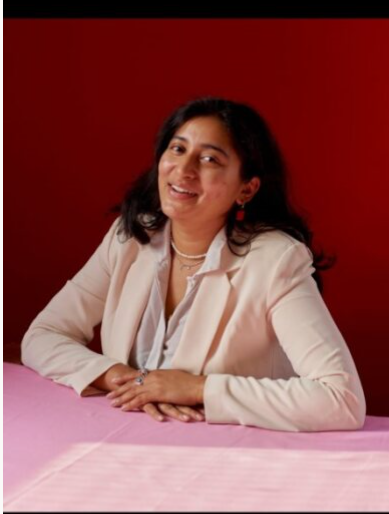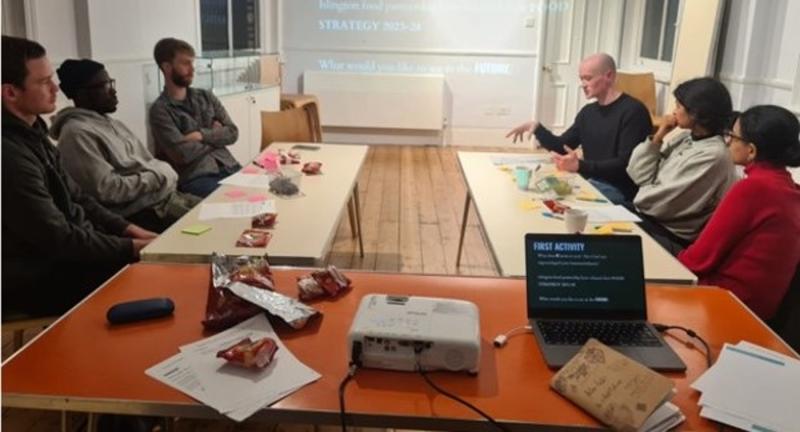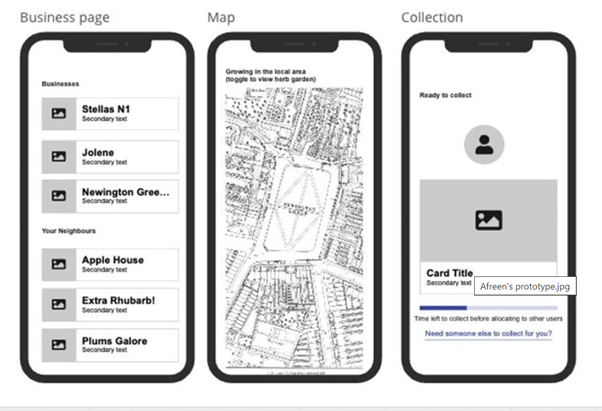Joanna Watson18 Jun 2024
At Friends of the Earth’s residential event at Hawkwood to explore AI and community action, Afreen met an elderly lady by an iconic tree in the grounds. She lived within the community and had her own herb garden. They talked about what Afreen hoped to achieve through the Lab and the lady counselled the following – “make sure this project is about an us not just you”. This struck a chord with Afreen, as it reflected her approach to her work in her community and the principles for designing with care that she lives by.
She reflects that
AI is just another tool but we mustn’t forget the humans in the middle of it. It can be a conduit for bigger human connection and relationships - not a replacement.
JW: So where did you hope to use AI and how did you get involved in the Lab?
AS: I’m a design researcher and run 100kicks, a small research consultancy. I’ve been frustrated that big tech companies’ research is carried out by a small subset of privileged people. There’s a danger that AI is developed without meeting the needs of wider society, and especially those from a minority backgrounds.
I expressed these concerns to Mary Stevens from Friends of the Earth’s Experiments Team at a really cool conference on responsible AI and she invited me to the upcoming Lab on AI and Community Action. I was wondering how we might use AI to rethink food distribution and manage food waste in my local community of Newington Green, North London and was very excited about sharing ideas with other participants in the Lab.
People tend to work in silos so it was really stimulating to talk about the potential and implications of AI with a group of curious people with lots of different perspectives. Leaving the initial residential event, I was inspired to be going into my neighbourhood to talk to ordinary people who aren’t usually thinking about how AI might be used in addressing local problems.
JW: What is the problem you are trying to address?
AS: Newington Green, where I live is rapidly gentrifying. My neighbours are Black and have lived there longer but many of these expensive shops that are opening up are beyond their means. Healthy and ethically produced food should be accessible to everyone, yet food waste and food insecurity is an issue here. Could there be a smart AI solution to bridge the gap and help us think about food futures and how to restructure the system?
I had originally hoped to gather data from lots of residents in my neighbourhood but very quickly realised that this was too broad for my time and capacity and decided to focus instead on conversations with local businesses involved in food retail.
JW: What did you do?
AS: I brought together a small group of local business owners in a workshop to explore a wide question: What are your thoughts on Food and AI?
They were initially apprehensive - they had read lots of bad things and worried about the futures of their jobs but they were also able to imagine how AI could be useful. I used ChatGPT to condense the Islington Food Strategy and this formed the basis for discussion. It opened up the conversation and showed the gap between policy makers and what small business owners think.
They started by thinking about AI as a concept and then began to come up with amazing ideas together. People really enjoyed doing joint activities and thinking through the problem. They shared ideas on how AI could help them reimagine new worlds and what it could look like at the local level, designed by and for local people.
Some takeaways from the workshop:
- How realistic and actionable is the Islington Food Strategy?
- The app, Too Good to Go, which saves surplus food from going to waste, doesn’t benefit local business enough or address local food insecurity.
- Food waste collection is a pain point.
- Tracking food temperature is a barrier to redistribution – AI could help.
I incentivised folks for their valuable time and insights, so that they would know that their input is valued, even before attending the session. This is good research practice and something that needs to be kept in mind when engaging with people from under-represented communities.
JW: How might you use AI going forward?
AS: Food waste is the most costly issue facing local businesses – there needs to be an incentive to engage with AI. So if AI could bring the costs down then you could think about tackling food distribution and food insecurity. I created a paper prototype of a hyper-local, community-first, food surplus redistribution app, that aims to tackle issues around food insecurity and local business waste in a more pragmatic way. I’d like to develop using AI as a conduit for community collecting and re-allocating of food surplus to reduce food waste.
I would bring design with care into developing this – personalizing and democratizing the tech and flipping people’s sense of shame for having to use a food bank into a sense of doing a good thing by using food that would otherwise go to waste. For businesses it’s not about charity – it would be good for their business and good for helping to build a more resilient society.
JW: What next and what help do you need?
AS:
- A source of funding to get a prototype off the ground and to run more workshops with local people.
- Practical prototype to test with local businesses.
- A network of people to offer advice and support and to be able to bounce ideas off.
- Work with Islington Council to figure out pathways in which these ideas may be implemented and the Islington Food strategy be brought to life.
- Follow-up contacts with Hackney Council who are quite far-sighted in approach. Things don’t used if they’re not promoted – Councils are slow moving but could be a way to cut through red tape – if you can do it together you might circumvent the problems.
And very importantly, I want to build on this super-valuable information I’ve collected about what local people think about AI. We need to think about the big gap in knowledge about AI and how it can help us build connection. More than ever, I’m interested in how we can involve and amplify the voices of people who don’t usually get involved in conversations about using AI. And the novel ways in which we can do that. Like, that's something I'm really even more amped up about now after having engaged in this project.
Want to help Afreen to explore using AI to help her community imagine interconnected food futures? Contact her on [email protected].




